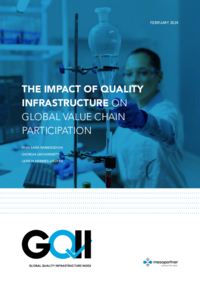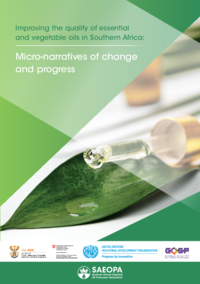Quality Infrastructure
Mesopartner collaborates globally in the development and dissemination of Quality Infrastructure (QI). Our mission is to make the contribution of quality infrastructure to trade, health, and food safety visible and help the QI bodies to make their services demand-oriented and effective for sustainable development.
QI relates to an institutional setup that builds trust in international trade and, in general, for sustainable development.
Mesopartner is supporting all major development organisations active in promoting quality infrastructure. This includes the German Metrology Institute (PTB), UNIDO and the World Bank Group.
Mesopartner QI consultancy covers a broad range of methodologies:
- We are assessing national quality infrastructure using the rapid diagnostic tool of PTB and the World Bank, for which we have developed a practical handbook.
- Mesopartner has developed a survey to assess the needs and demands of existing and potential QI users of the industry and public sector.
- PTB’s CALIDENA methodology, co-developed by Mesopartner, is a practical approach to enhance collaboration between large and small firms and QI bodies in developing countries. It is pragmatic, participatory and action-orientated.
- Micro-narratives to assess current and future quality demand using the SenseMaker methodology.
- Assessment of National Quality Infrastructure systems (i.e. Malaysia) and design of quality policies (i.e. Caribbean countries) at the level of countries and regions.
Standards and National Quality Systems that matter for competitiveness
There are two perspectives on quality issues: one is from the side of firms, which mainly look to standards and certifications to comply with the requirements of demanding clients and/ or gain access to more lucrative markets. On the other side, we have the service providers and support institutions of the so-called National Quality System (NQS) or Quality Infrastructure (QI). These technical terms refer to a specialised system of bodies in charge of quality assurance and conformity assessment. In former times the acronym MSTQ (Metrology, Standards, Testing and Quality Assurance) was used. These entities focus on precise measurement and the formal accreditation of certification bodies, laboratories and inspection bodies. The interest of firms in being competitive is often beyond the horizon of responsibility of QI bodies.
Although the raison d'être (reason for being) of a National Quality System (another synonym for QI) is to support firms and protect consumers, their services are mainly used by larger, export-oriented companies. This is even more true in developing countries, where the majority of the economy is made up of micro and small firms that are working for the local market and many of which lack formalisation. Hence, we almost exclusively find representatives of large firms and their business associations and chambers in the governmental bodies of National Metrology Institutes (NMIs), Accreditation Bodies or Committees for Standard development. The services of QI bodies are consequently orientated towards the needs of the larger, international companies.
The exclusion of a large part of the developing economies from QI services is bad for local firms and consumers. Even though developing countries are opening their markets, SMEs rarely take advantage of this business opportunity, because of the quality requirements of the trade partner. The latter may be a country or a large buyer with its own quality requirements; in both case we find a specific expression of non-tariff barriers to trade (NTBs). Therefore, these small firms often lose competitiveness in relation to larger firms from their country and foreign companies. As many local firms do not comply with quality requirements, local consumers who buy their products and services are also discriminated against. All in all it is a vicious cycle.
How do we break this negative dynamic? Mesopartner is working to connect both worlds: we are facilitating Private Sector Development (PSD) like clusters and value chain and at the same time advising QI bodies on how to be more user-orientated. As the SME sector of developing countries lacks a voice and resources, the support of development agencies is very important.
How can development practitioners engage with the process? Practitioners active in private sector development, especially in value chain and cluster projects, are invited by Mesopartner to broaden their perspective and share experiences on how to upgrade the wider system of quality infrastructure beyond certain interventions in specific industries and locations. Representatives of QI bodies are also invited to contribute to the exchange on how to make quality services more customer-orientated. The proposal of Mesopartner – in close cooperation with the Technical Development Unit of PTB – is to create and consolidate knowledge and practical methodologies around the support of the QI for PSD.

Join Mesopartner for a three-day training on various global quality infrastructure development topics, including trade, innovation, sustainability, and digitalisation:
Date: 30 September - 2 October 2024
Venue: mainhaus Stadthotel Frankfurt, Germany
Who should attend:
The target audience for this training is the staff of international organisations, development consultants and policymakers in trade and economic development.
What you will learn:
The training will give participants the knowledge and skills to analyse and promote quality infrastructure systems.
For more information about the event, please visit the event website.
Contact us
If you would like to engage us on this topic, email Christian Schoen or Dr Ulrich Harmes-Liedtke.

Additional pages
Visit our Research topic - Quality Infrastructure
Visit our CALIDENA page
Visit our Quality Infrastructure for Development (QI4D) Blog page











